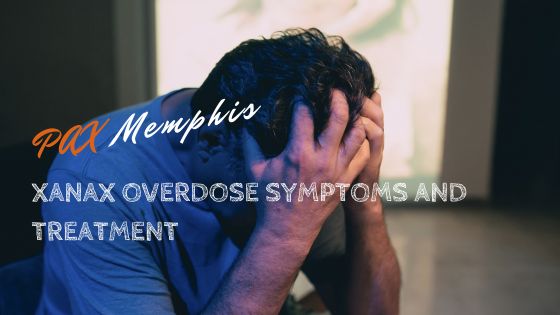Benzodiazepines are central nervous system depressants that produce calming effects. They are primarily used to treat anxiety and panic disorders. Doctors might also prescribe benzodiazepines to treat seizure conditions and insomnia.
While benzodiazepines are effective for many different medical uses, they are known to be addictive. When someone is addicted to a benzodiazepine, it increases the risk of life-threatening overdoses. According to the National Institute on Drug Abuse (NIDA), 12,499 people died from a benzodiazepine overdose in 2021 in the United States.
One of the most commonly abused benzodiazepines is Xanax (alprazolam). If you are prescribed Xanax by a doctor, it’s important to know that taking it long-term can lead to addiction.
If you are addicted to Xanax, you are at an increased risk of overdose. Xanax overdose symptoms may include impaired coordination, slurred speed, and stopped breathing. You should always call 911 if you believe someone is overdosing on Xanax.
What are the Side Effects of Xanax?
People might use Xanax to treat their anxiety, seizures, or insomnia. On the other hand, individuals may abuse it to experience a euphoric and drowsy high. Either way, Xanax is known to be addictive.
The side effects of Xanax include:
- Dizziness and drowsiness
- Lightheadedness
- Headaches
- Tiredness and irritability
- Increased chattiness
- Trouble concentrating
- Dry mouth or increased salivation
- Nausea
- Constipation
- Changes in appetite and weight
- Trouble urinating
- Joint pain
Xanax is addictive because of the way it affects chemicals in your brain. For example, it affects the levels of dopamine that your brain releases, causing it to associate Xanax with pleasure and reward. Risk factors like a history of substance abuse can increase your chances of becoming addicted to Xanax.
What are the Symptoms of Xanax Overdose?
If you abuse Xanax, chances are that you take higher doses than recommended. Unfortunately, this can lead to a fatal overdose. Knowing the symptoms of a Xanax overdose can help you decide when it’s time to call 911.
The symptoms of a Xanax overdose might include:
- Extreme drowsiness or sedation
- Mental confusion and slurred speech
- Low blood pressure
- Coordination issues
- Complete loss of consciousness
- Slowed or stopped breathing
Xanax is a central nervous system depressant, so an overdose can cause respiratory arrest. This means Xanax overdoses can lead to brain injury, coma, and even death. As a result, you should always seek emergency services from medical professionals.
Some people might combine Xanax and alcohol. Doing so increases your chances of experiencing a life-threatening overdose. That said, you should avoid drinking alcohol while you are taking Xanax.
What to Do if Someone Overdoses on Xanax
Xanax overdoses are emergencies that require medical intervention. The longer you wait to get help, the less likely it is that the person will survive. In other words, if you believe someone is overdosing on Xanax, call 911 immediately.
In addition to calling 911, take the following steps:
- Turn the person on their side to keep their airway open and prevent choking in case of vomiting
- Start CPR if you are trained to do so
- Monitor and stay with the person until emergency services arrive
- Answer the medical professional’s questions honestly
It is important to note that you will not get in trouble for drug possession if you are reporting an overdose. There are laws in place to protect you to ensure no one is afraid to get their friends or loved ones help in case of an emergency.
Additionally, if you believe the person has taken opioids with Xanax, there is another step you can take. Naloxone (Narcan) is a medication that reverses opioid overdoses. If they are overdosing on opioids, this can reverse the effects and save their life.
How is Xanax Overdose Treated?
Xanax overdoses require emergency medical care, but how exactly is it treated?
Medical professionals will use their judgment to determine what type of treatment is necessary. If someone is having trouble breathing because of a Xanax overdose, they will intubate them. This means a tube is placed into their airway to help them breathe.
Another way Xanax overdoses are treated is through the use of Flumazenil. This medication is often referred to as the “antidote” for Xanax overdoses. While it can reverse the effects of benzodiazepines, it can also cause precipitated withdrawal.
If Flumazenil is used, medical professionals will monitor the patient to ensure they do not experience severe withdrawal symptoms. If symptoms occur, they will receive medications to treat them.
Activated charcoal may also be used to induce vomiting. This can prevent a person’s body from absorbing all of the Xanax they consume. That said, this method only works if the person is not experiencing life-threatening symptoms already.
In all cases of Xanax overdoses, intravenous fluids are required to help flush the person’s system.
Find Help for Xanax Abuse and Addiction
If you or a loved one regularly abuses Xanax, it’s time to seek professional help. Xanax abuse often leads to addiction, withdrawal, and even life-threatening overdoses. Xanax addiction treatment centers can offer you the tools and support you need to maintain long-term recovery.
Contact PAX Memphis today to get connected with a Xanax rehab center near you.
Medically Reviewed: September 25, 2019

All of the information on this page has been reviewed and verified by a certified addiction professional.










